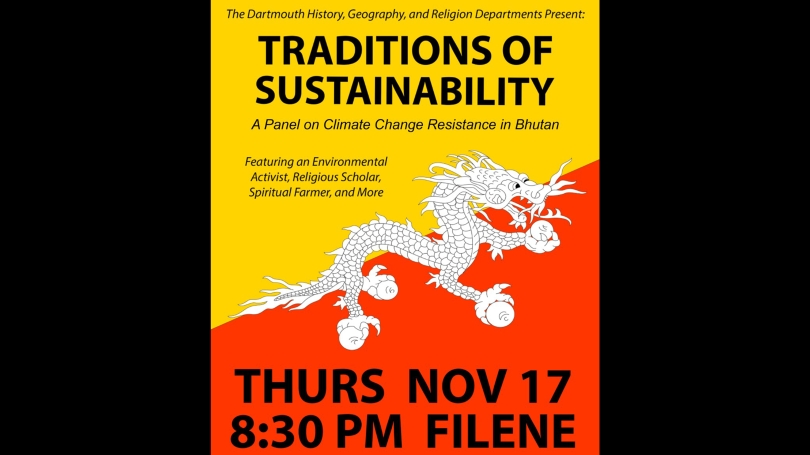
- Undergraduate
- Research
- Foreign Study
- Inclusivity
- News & Events
- People
Back to Top Nav
Back to Top Nav
Students in Professor Moreton's HIST 33.02 American Anthropocene: Climate and Power in U.S. History organized a panel on November 17th on climate change resistance in Bhutan. Read their description of the panel below.
Traditions of Sustainability: A Panel on Resisting Climate Destruction was a panel organized by Jesse VanNewkirk '23, Lola Ellenberg '23, Noah Roper '23, and Megan Wu '23, students of History 33.02: American Anthropocene: Climate and Power in U.S. History taught by Professor Bethany Moreton. Much of the class's discussion has centered around the limitations of alleviating and resolving the climate crisis in the U.S. given the widespread climate change denialism, libertarian free market structure, influence of corporations, and the lack of institutional accountability.
We chose to investigate a country that has made meaningful progress and created actionable solutions to the climate crisis through adopting a different framework. Bhutan's environmental and economic policy, paired with their dominant Buddhist practices proved to be a fascinating study. Their Gross National Happiness index, which is used as a measure of wellbeing (over conventional GDP metrics), spans nine domains, covering ecological diversity and resilience, community vitality, and more. Bhutan also has a constitutional forestry mandate, requiring that 60% of land remain under forest cover at all times. Additionally, the dominant religion of Buddhism encourages that people be stewards of the environment, with high regard for land and animals. Five speakers from Bhutan joined us on November 17th at 8:30pm to speak about their work and experiences interacting with these various policies and structures.
In the face of current American politics, meaningful steps to combating climate change have oftentimes felt radical and unrealistic. However, we hope that Bhutan serves as a practical and hopeful model as we think about the future forward in addressing the climate crisis.
Thank you to our speakers: Dr. Karma Phuntsho, a Buddhist scholar and former monk; Nedup Tshering, the executive director of Clean Bhutan (a sustainability non-profit); Sangay Dorji, a GNH scholar; Farmer Sangay, a spiritual ecologist and moral philosopher; and Dawa Yoezer, a top-rated tour guide for sharing their expertise, insights, and beliefs. Special thanks to the History and Religion departments for co-sponsoring the event, as well as Professor Moreton, Bruch Lehmann, and Dawa Yoezer for their assistance in helping to organize the event.